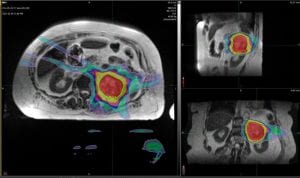MRIdian: UK’s first MR-guided fully adapted SABR for renal cancer
We recently treated a renal primary cancer with MR-guided stereotactic radiotherapy on the MRIdian at GenesisCare in Oxford. We believe this was the first MR-guided fully adapted stereotactic radiotherapy treatment of renal cancer in the United Kingdom.
Renal cancers have traditionally been thought of as resistant to radiotherapy, though this theory no longer holds true in the era of modern image-guided radiotherapy. Stereotactic Ablative Body Radiotherapy (SABR) in renal cancer yields very good results, allowing treatment of cancers in patients who would not be considered fit enough for an anaesthetic or who do not wish to undergo percutaneous ablation or nephrectomy.
In a study looking at single fraction SABR to 118 consecutive patients, the rates of local control, cancer-specific survival, and progression-free survival (PFS) were measured.[1]
At 2 years:
- Local control – 97.8%
- Cancer specific survival – 95.7%,
- PFS – 77.4%
At 4 years:
- Local control – 97.8%
- Cancer specific survival – 91.9%
- PFS – 65.4%
When renal cancers arise in patients who are medically inoperable, or who wish to avoid surgery, and where focal ablation such as radiofrequency ablation is not indicated due to the size or position of the cancer in the kidney, SABR is a viable alternative that allows effective treatment in this older, largely medically inoperable cohort with clearly demonstrated efficacy, tolerability and modest impact on renal function in this patient population.[2]
MRIdian MR linac for MRI-guided radiotherapy
We’re proud to be the first independent healthcare provider in the UK to introduce the MRIdian – an advanced MR linac. This world-class radiotherapy system is available at our centres in Oxford and Cromwell Hospital in London and can be accessed by patients throughout the UK.
MRI-guided radiotherapy improves on conventional image-guided radiotherapy (IGRT) by providing enhanced soft tissue definition without additional radiation exposure through high-quality MR images. By capturing live MR images of the target many times per second, the MRIdian provides real-time, moving images that capture the anatomical position changes that occur naturally within the body. Uniquely, the MRIdian allows tracking of the target position in real time, coupled with a gating facility that prevents beam delivery when the target is outside the treatment boundaries. This level of accuracy means that uncertainty is reduced, eliminating the need for large margins around the target.
The UK’s first MR-guided fully adapted stereotactic radiotherapy treatment of renal cancer
In what we believe to be a UK-first, our renal primary cancer patient was treated at GenesisCare in Oxford using MR-guided fully adapted stereotactic radiotherapy on the MRIdian MR linac.
This was a 70-year-old patient with multiple longstanding comorbidities who had been found to have a large left sided kidney tumour staged at T2N0M0. The patient was unable to accept nephrectomy as it was felt they would not tolerate the surgical process or the recovery period.
Therefore, the patient was deemed suitable for MRIdian treatment, over a course of five treatment visits on alternate days to a total dose of 40 Gy in 5 fractions.
The patient tolerated treatment well, developing mild frank haematuria after the second dose of treatment that lasted 24 hours (which did not recur) and mild nausea throughout the course of treatment as expect.
Renal cancers are recognised not to shrink visibly following stereotactic radiotherapy and often retain similar vascular perfusion patterns before and after treatment. Therefore, while follow up for renal cancer patients will involve imaging, the recommendation of international authorities is to delay initial scanning and to be aware of pseudo-progression which results from initial oedema within the target, mimicking tumour growth.
If you would like more information about how to access these treatments for your patients, please don’t hesitate to contact urologysat@genesiscare.co.uk
Philip Camilleri
Clinical Director of Urological Cancers
GenesisCare
References
- Siva S, Louie A, Warner A, Muacevic A, Gandhidasan S, Ponsky L et al. Pooled analysis of stereotactic ablative radiotherapy for primary renal cell carcinoma: A report from the International Radiosurgery Oncology Consortium for Kidney (IROCK). Cancer. 2017;124(5):934-942.
- Siva S, Correa R, Warner A, Staehler M, Ellis R, Ponsky L et al. Stereotactic Ablative Radiotherapy for ≥T1b Primary Renal Cell Carcinoma: A Report From the International Radiosurgery Oncology Consortium for Kidney (IROCK). International Journal of Radiation Oncology*Biology*Physics. 2020;108(4):941-949.
